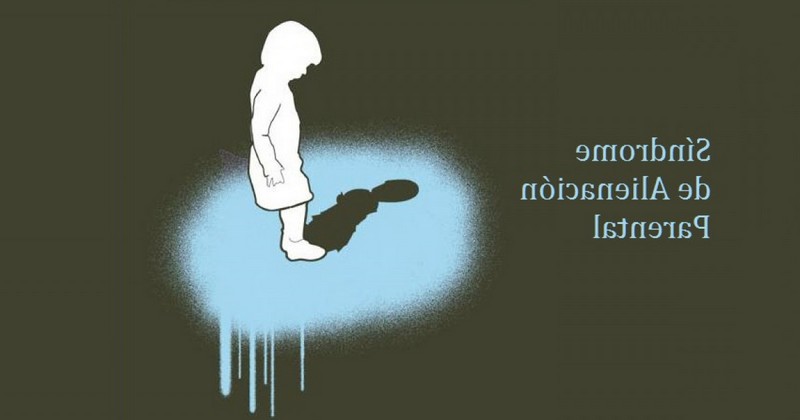Parental Alienation Syndrome (SAP): a form of child abuse

What is SAP and how can we prevent children from suffering from it?
The separation of a marriage is not easy for those affected, and it seems incredible the reaction they can have towards each other. The hatred they are capable of feeling for each other has attracted the attention of many psychologists, as the often unimaginable contemptuous behavior that can be seen in this situation masks the love that the former partner may have once felt.
But the problem is aggravated when there are children involved.. They can suffer more than anyone else from this painful situation. Especially when the parents use them to hurt the other. This is known as Parental Alienation Syndrome.
What is Parental Alienation Syndrome?
The Parental Alienation Syndrome (SAP) is a set of symptoms that result from the use of different strategies by one parent, in which he/she influences the child's thinking with the intention of destroying the relationship with the other parent.
SAP can occur when the child is influenced by one parent (parent A) to reject the other parent (parent B). For example, parent A may tell the child that parent B does not want to visit, when, in fact, parent B is working.
On many occasions, this type of negative influence, used repeatedly, causes the child to reject the other parent..
It is necessary to reflect on the Parental Alienation Syndrome and the real danger of parents who use this type of behavior to harm their ex-partner, because the child is the one who really suffers the negative consequences of this situation.. But this should also be treated with caution, as some parents, for their legal defense, may accuse the other partner of using SAP against them even if it is not true.
Signs of Parental Alienation Syndrome
How do alienating parents act? These are the characteristic behaviors of parents who carry out SAP:
- Belittling, insulting, or belittling the other parent in front of the child, bringing up issues about the couple that have nothing to do with the parental bond.
- Telling a child the details of the divorce when the ex-spouse is not present, but as if the ex-spouse is to blame. The parent is trying to make the child think that the other parent is the victim and so does not empathize with him/her.
- Not allowing the child the right to live with the other parent of the child with the other parent.
- Influencing the children with lies about the other parent to the point of scaring them.
- Include family and friends in attacks on the other parent. in attacks on the other parent.
- Underestimating or ridiculing children's feelings toward the other parent. towards the other parent.
- Gratifying and reinforcing the child's derogatory and rejecting behaviors and rejection behaviors on the part of the child towards the other parent.
Causes of this phenomenon
Why might a parent want to damage their child's relationship with the other parent? The causes may differ from parent to parent, as each case is usually different. Here are some of them:
- Anger built up during the relationship because problems were not dealt with in the right way.. Lack of anger control may result, in these cases, in parents not being able to separate relationship problems from their parental roles.
- Self-esteem problems. This leads to emotional dependence on the other parent.
- Lack of social skills and difficulties in expressing anger. and understanding of emotions. They may be unable to empathize with the child and former spouse.
- Personality disorders. For example: narcissism or Borderline Personality Disorder.
Preventing SAP is the best therapy
Parental Alienation Syndrome is a complex phenomenon because of the environment in which it happens. It is a real problem that can be experienced by separated families or families that are in the breaking-up phase, but it also manifests itself in the judicial environment.. There are many men and women who use their children as a weapon against the other and induce them to have negative thoughts about the other parent.
The American Psychological Association has not recognized it as a disorder and, for that reason, it does not appear in the DSM-V. But the suffering it can cause in the actors is devastating, because the emotional damage caused by this phenomenon can affect children for the rest of their lives.
The best way to treat it is to prevent it. Once it occurs, it is necessary to attack it from different fronts. That a child suffers because of parental irresponsibility is tremendously unfair. That is why, the attitude of the parents towards their breakup is crucial for the well-being of their child..
Since SAP is a form of child abuse, once it has occurred and is diagnosed, it can have legal consequences. For example, a change in custody for the child to re-bond with the parent who has been the victim of parental alienation. Sometimes it may happen that the child refuses, and that is why the issue must be treated with great care. Therapy becomes necessary to reverse the situation and, on many occasions, it is the judge himself who can intervene.
Bibliographic references:
- Infocop
(Updated at Apr 12 / 2024)